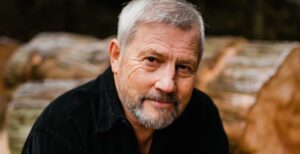Karl Marlantes: Cold Victory, a Novel
June 21, 2024 by David
Filed under Fiction, WritersCast
 Cold Victory: A Novel — Karl Marlantes — Atlantic Monthly Press – 978-0-8021-6142-0 – Hardcover — 352 pages — $28.00 — January 9, 2024 — ebook versions available at lower prices
Cold Victory: A Novel — Karl Marlantes — Atlantic Monthly Press – 978-0-8021-6142-0 – Hardcover — 352 pages — $28.00 — January 9, 2024 — ebook versions available at lower prices
I have to confess at the outset that Karl Marlantes has become one of my favorite authors of recent times and his latest book Cold Victory, is yet another outstanding novel from this author, whose first novel, Matterhorn, was published in 2010 after a full thirty years of effort. I’ve had the pleasure and privilege of interviewing Karl for all three of his previous books, each of them very different in subject matter and approach. A characteristic that is common to all of this author’s books is his extraordinary ability to create believable, wonderful characters that truly come to life on the page.
Cold Victory is related Karl’s 2019 novel Deep River, through a single common character. Deep River is set in the Northwestern United States in the early twentieth century, while this new book takes place in Finland right after the close of World War II. It’s safe to guess that most readers, like me, will be unaware of Finland’s complex role in that war, allying first with Germany to fight the Soviet Union to keep the latter from taking over its much smaller neighbor, and then allied itself with the Allies to fight Germany. Basically, Finland fought anyone and everyone to maintain its independence. In the aftermath of WWII, Finland was forced to pay reparations to the Soviets and gave up 10% of its land to the USSR.
In Cold Victory, the main characters are American and Russian, but the countries and the people of Finland have equal importance to the story. The American and Russian protagonists are two couples of similar age, but with such different life experiences that they must relate to each other on what they do share — honor, and love of soldiering for the men, commitment to their children and friendship for the women.
In the early parts of the novel, Marlantes sets the scene – his knowledge and appreciation for Finland, its culture and history, is palpable, and he uses his extensive knowledge to build a solid background for what develops into a riveting story that is sometimes extremely uplifting and often painful, as the tragedy at the center of the book unfolds. Marlantes’ story telling is vivid and powerful, the energy of his words always pulling us forward.
And I have to note that Karl has mastered his material – the descriptions of cross country skiing through bitter cold Finland are brilliantly portrayed. Be prepared to feel the cold in your soul.
This is another terrific novel from an outstanding writer whose skills are constantly evolving. And Karl is always a pleasure to speak with. Please enjoy our conversation and I hope you will pick up this book.
“For the history lesson alone, Cold Victory is memorable.”—Mark Steve’s, NY Journal of Books
Karl Marlantes graduated from Yale University and then was a Rhodes Scholar at Oxford University, before serving as a Marine in Vietnam, where he was awarded the Navy Cross, the Bronze Star, two Navy Commendation Medals for valor, two Purple Hearts, and ten air medals. He lives in Washington State.
Interview about Deep River
Interview about Matterhorn
Interview about What It Is Like to Go to War
Podcast: Play in new window | Download
Robert Child: Immortal Valor: The Black Medal of Honor Recipients of World War II
May 26, 2022 by David
Filed under Non-Fiction, WritersCast
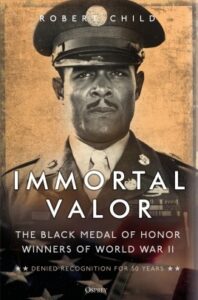 Immortal Valor: The Black Medal of Honor Recipients of World War II – Robert Child – Osprey – 9781472852854 – 288 pages – hardcover – $30 – January 11, 2022 – ebook edition available at lower prices
Immortal Valor: The Black Medal of Honor Recipients of World War II – Robert Child – Osprey – 9781472852854 – 288 pages – hardcover – $30 – January 11, 2022 – ebook edition available at lower prices
It is remarkable to realize how few medals of honor were awarded for service during World War II – there were 432 Congressional medals given out of the over sixteen million men and women who served during that four year period during which America fought large scale brutal wars in both the Pacific and European theaters. It is therefore shocking to find out that not a single African American was among the 432 honorees, despite the fact that over one million African Americans served in the then mostly segregated military environment.
Racism remains an American fact of life. But the “progress” made in the modern era probably has muddied our awareness of what our country was like such a short time ago. Robert Child has done an admirable service with this book, documenting the incredible heroism of the seven Black American heroes of World War II who were finally recognized for their efforts – but only after an incredibly long period of time and much work in their behalf.
Child documents the recent historical investigations that have discovered and the stories of extraordinary acts of heroism and valor by the Black soldiers in World War II who were eventually awarded the highest honor our country offers for wartime service. The group of servicemen includes Vernon Baker, Sergeant Reuben Rivers, and Lieutenant Charles Thomas, who led his platoon that captured a strategically important village in Germany in 1944 despite suffering grievous wounds and losing half the men in his unit. The other four who are portrayed sympathetically and thoroughly in this book are Willy James, Jr., John Fox, Edward A. Carter, Jr., and George Watson, heroes all, not only for their valor in the fights they undertook, but for what they did to overcome the deep-seated endemic racism in the military during the time they served their country.
It was not until 1993 that a US Army commission determined that these seven men had been denied our country’s highest award – only because of racial discrimination. And then it was in 1997, more than 50 years after the war that President Clinton finally awarded the Medal of Honor to them, with only one still being living at the time.
Their stories comprise most of this book, as well as some background about the military before, during and after World War II. Sadly, it is almost certain that there are other Black service men and women who might have deserved recognition for their sacrifices and heroism in that war. It was not even until the Obama administration that two World War I heroes were recognized, Sergeant William Shemin, for whom the anti-semitism of the time meant his amazing feats of heroism were almost lost to history, and Sergeant William Henry Johnson, another Black soldier who had been recognized by France with a Croix de Guerre in 1919, but neglected by the United States for far too long.
It was an honor for me to speak with author Robert Child about this terrific and highly emotional book.
Child is a military history writer, director, and author with. Robert has received writing and directing awards including an Emmy® nomination. He lives in Atlanta.
“This is the only comprehensive narrative written about the African American Medal of Honor recipients of WWII to date. Extremely well written, with very little personal background on some of these men to work with, Child manages to bring each of these heroes’ stories to life on a personal level. Child carefully reconstructs each recipient’s life prior to his act of valor, demonstrating the character traits that made each an example of integrity, sacrifice and courage. This is a must-read book about seven black soldiers and their bravery at the highest level and the racial injustice that took over four decades to acknowledge. Well done!” ―Arthur Collins, President, 5th Platoon, the black World War II education and reenactment group
Podcast: Play in new window | Download
Even as We Breathe, A Novel: Annette Saunooke Clapsaddle
December 1, 2020 by David
Filed under Fiction, WritersCast
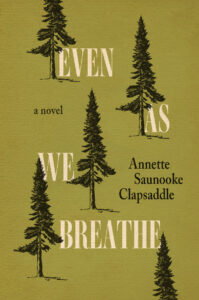 Even as We Breathe, A Novel – Annette Saunooke Clapsaddle – 9781950564064 – University Press of Kentucky – Hardcover – 240 pages – September 2020 – $24.95 – ebook versions available for sale at lower prices
Even as We Breathe, A Novel – Annette Saunooke Clapsaddle – 9781950564064 – University Press of Kentucky – Hardcover – 240 pages – September 2020 – $24.95 – ebook versions available for sale at lower prices
This has been a good year to read fiction, and I am really pleased to have discovered this author. She is a fine writer whose storytelling is powerful, yet restrained.
While this novel has some elements of a mystery, it is really a very personal story about family, love and growing up into the world of western North Carolina during World War II. The book’s main character is nineteen-year-old Cowney Sequoyah, who has grown up in the woods of Cherokee land, raised mostly by his grandmother. The novel is set between the upscale Grove Park Inn, an Asheville resort serving as an internment camp for diplomat prisoners of war and their families.
The Inn provides Cherokee men and women with employment off their reservation, and this is Cowney’s first real time away from home. At the core of the story, Cowley is accused of being involved in the disappearance of a diplomat’s daughter and must move back and forth to home as he attempts to understand the basis of the the unfair accusations, and prove his innocence while at the same time wrestling with his newfound love for another young Cherokee, Essie Stamper, and figuring out his complex family history.
There is alot going on in this subtle and quietly told novel! And a number of surprises are in store for the reader that bring the story to a remarkable and rewarding close.
Even As We Breathe is filled with details and moments that identify the Cherokee tribe and its homeland. The story gives Annette the opportunity to express the meanings of the Cherokee culture as it has survived into the modern world, sometimes still with the values of its people in conflict with the world of white people.
A secret room in the Grove Park Inn becomes a place where Cowney and Essie can escape the white world and try to imagine their futures independent of outsider influences. For awhile, it can feel to them that they have a place of their own. But racism and prejudice are constantly present, and both Cowney and Essie must face disappointment, and struggle to define their identities as Cherokees within a complicated environment that does not give them the space they truly need to be themselves.
Annette Saunooke Clapsaddle, an enrolled member of the Eastern Band of Cherokee Indians (EBCI), graduated from Yale University and has a masters from the College of William and Mary. Her unpublished novel, Going to Water won the Morning Star Award for Creative Writing from the Native American Literature Symposium and was a finalist for the PEN/Bellwether Prize for Socially Engaged Fiction. After serving as Executive Director of the Cherokee Preservation Foundation, Annette (National Board Certified since 2012) returned to teaching English and Cherokee Studies at Swain County High School. She is the former co-editor of the Journal of Cherokee Studies and serves on the Board of Trustees for the North Carolina Writers Network.
“Debut writer Annette Saunooke Clapsaddle lifts the curtain to show us a South we don’t know, revealed through the struggles of Cowney Sequoyah, a young man growing up within the Cherokee Nation of far Western North Carolina, and yet another surprise setting when he takes a job at Asheville’s fabled Grove Park Inn while it is being used by the US military as a place of internment for Axis prisoners of war during World War II. Even As We Breathe is a wonderful novel, complicated as life itself — thrilling, mysterious, and finally, a revelation!” — Lee Smith, New York Times bestselling author of Blue Marlin
This novel was impossible for me to put down and is one of my favorite books I have read this year. It was a deep pleasure for me to speak with Annette about this book and her writing.
I believe you will enjoy this conversation as much as I did.
Purchase Even as We Breathe from Bookshop.org to support independent bookselling.
Author’s website here.
Podcast: Play in new window | Download
The Vanishing Sky (A Novel) by L. Annette Binder
October 27, 2020 by David
Filed under Fiction, WritersCast
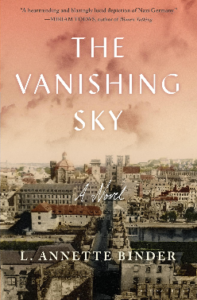 The Vanishing Sky (A Novel) – L. Annette Binder – 9781635574678 – Bloomsbury Publishing – Hardcover – 288 pages – July 21, 2020 – $27.00 – ebook versions for sale at lower prices
The Vanishing Sky (A Novel) – L. Annette Binder – 9781635574678 – Bloomsbury Publishing – Hardcover – 288 pages – July 21, 2020 – $27.00 – ebook versions for sale at lower prices
I did not know what to expect when I started reading The Vanishing Sky. Initially, I was looking forward to reading a book that did not focus on the victims of Nazi Germany, but on Germans themselves. Yet I found that it was much more difficult for me to get into than I anticipated. I am not sure why, but I resisted the book and almost set it aside. I wanted to not like the characters. I wanted to not be sympathetic to them, or their situation, my deep-seated antipathy toward mid-century Germany and its people emerging from my psyche.
The Vanishing Sky is about a family struggling to survive at a time when World War II is coming to an end. The focus of the book is on Etta Huber, a hausfrau in a small town, whose eldest son had joined the army and gone to fight in the east, now coming home a broken man, and whose younger son, is dreamier and unmilitaristic child-like, and struggles with the country’s expectations for a German male. At the same time, Etta’s husband is a difficult, quite traditional German man, a veteran of WWI, but who does not know how to act in his stage of life during wartime.
Binder is a fine writer who builds a slow burning fire from a few tiny sparks and I found myself fully engaged with her characters, and immersed in their lives as I continued reading this book. The story and the characters bring us face to face with uncomfortable realities. These are humans struggling to find their identities in horrible circumstances, where there is nothing approaching normality. And of course, as it is set in Germany in the very final months of World War II, it is not a typical war novel. The book is about the people on the home front and it becomes impossible to not feel an uncomfortable resonance to our own time.
It was truly a pleasure to speak with Annette about this remarkable novel and I will be looking forward to reading her next book.
The Vanishing Sky quietly sneaks up on the reader and makes us confront our understanding of ourselves with carefully wrought details and a surprising story line. It’s a rewarding novel that requires attention from the reader that is fully rewarded in the end.
“The Vanishing Sky reveals the German home front as I’ve never seen it in fiction… Binder tells her story patiently, like an artist placing tiny pieces into a mosaic; this literary novel isn’t one to race through. But I find it gripping, powerful, and a brave narrative, unsparing in its honesty.” — Larry Zuckerman, Historical Novels Review
Annette Binder was born in Germany and grew up in Colorado. The Vanishing Sky is her first novel, inspired by her family’s experiences in World War II Germany. Her collection of short stories, Rise, received the Mary McCarthy Prize in Short Literature. Annette has degrees from Harvard, UC Berkeley and the Programs in Writing at the University of California, Irvine. She lives in New England.
Podcast: Play in new window | Download
Susan Napier: Miyazakiworld: A Life in Art
February 20, 2019 by David
Filed under Non-Fiction, WritersCast
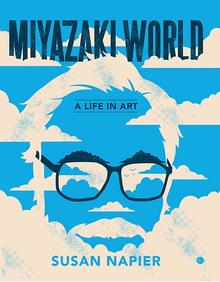 Miyazakiworld: A Life in Art – Susan Napier – 9780300226850 – Yale University Press – Hardcover – $30 – September 4, 2018 — 344 pages – illustrated – ebook versions available at lower prices
Miyazakiworld: A Life in Art – Susan Napier – 9780300226850 – Yale University Press – Hardcover – $30 – September 4, 2018 — 344 pages – illustrated – ebook versions available at lower prices
If you don’t know about Miyazaki and his spectacular animated films, I recommend you immediately seek out and watch at least two or three of the best of his films by way of introducing yourself to one of the most original and influential cultural figures of the post WWII era.
And this book, Miyazakiworld: A Life in Art, will be your guide to this creative genius’s oeuvre. Susan Napier brilliantly summarizes and analyzes Hayao Miyazaki’s life and work. She reveals much about the external influences on his work, his own particular life during and after World War II in Japan, and explores his cultural impact on Japan and the rest of the world, particularly the United States. Of course, if you are already familiar with Miyazaki, and have absorbed some or all of his incredible work, this book will illuminate much about the creator that you did not know before.
A thirtieth-century toxic jungle, a bathhouse for tired gods, a red-haired fish girl, and a furry woodland spirit all spring from the mind of Hayao Miyazaki, now well-known for films such as My Neighbor Totoro, Princess Mononoke, Spirited Away, Howl’s Moving Castle, and The Wind Rises.
Susan Napier is a professor at Tufts. She is a scholar specializing in contemporary Japanese culture. But this is not a dry academic explication of the master’s work. Napier is truly a fan, and she is a culturally adept explorer with a deep knowledge and understanding both of Japanese culture in general and of animated films and other key forms of Japanese pop culture. Napier brilliantly connects the multiple themes present in Miyazaki’s work, which features powerful female characters, is marked by environmental disasters, politically charged approaches to contemporary life, and a powerful sense of cultural and personal trauma and how to cope with it. She brings to life an understanding of an extremely complicated and sometimes mysterious individual, whose lifelong commitment to a unique artistic vision has transformed culture and art for millions of dedicated fans in Japan and all over the world.
Susan Napier is the Goldthwaite Professor of Rhetoric and Japanese Studies at Tufts University. She is the author of Anime from Akira to “Howl’s Moving Castle”: Experiencing Contemporary Japanese Animation, among other books.
It was my pleasure to have the opportunity to explore Miyazaki’s work in conversation with Professor Napier. You can read more about Susan from the Tufts website here. There was an excellent review of this book in the Washington Post here. And here is a link to the book at the Yale University Press website.
The NY Times was kind enough to make a 2017 list of Miyazaki’s films in order of importance – here.
Movie still from “Kiki’s Delivery Service.” (gkids/1989 Eiko Kadono – Studio Ghibli)
Podcast: Play in new window | Download
Charles Kaiser: The Cost of Courage
December 12, 2016 by David
Filed under Non-Fiction, WritersCast
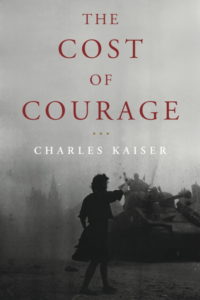 The Cost of Courage – Other Press – Hardcover – 288 pages – 9781590516140 – $26.95 (ebook versions available at lower prices)
The Cost of Courage – Other Press – Hardcover – 288 pages – 9781590516140 – $26.95 (ebook versions available at lower prices)
I read this beautifully written book about one family’s experience of World War II in France just before our recent election. At that time, I was not expecting to have to think about it in the context of our own political situation. Even without understanding that the incredible courage of his subjects may be instructive to us today, this book is about an incredible story of bravery and sacrifice. As of this moment, The Cost of Courage must be read in a new context.
All of us need to consider the lessons learned from the experience of everyday people in horrible circumstances like those of the French in occupied France. These were times of brutal repression and daily violence for individuals who constantly made momentous moral decisions with life and death consequences.
The Cost of Courage recounts the true story of the three youngest children of a bourgeois Catholic family, who worked heroically in the French Resistance during the Nazi occupation of France. Charles Kaiser was lucky enough to know this family from the time he was a small boy, because his uncle was billeted with them after the liberation of Paris by Allied forces.
In 1943, André Boulloche was working underground as General Charles de Gaulle’s military representative in Paris, coordinating Resistance activities in northern France. Unfortunately, he was betrayed by one of his associates, arrested and taken prisoner by the Gestapo. His two younger sisters continued to fight against the Germans until Paris was freed in 1944. André Boulloche managed to survive his time in three concentration camps through sheer force of will.
The elderly Boulloche parents and the oldest brother were also arrested when the Gestapo tried to capture the two sisters. Tragically, these three were on the last train the Germans ran from Paris to Germany before the Allies liberated the city, and they died soon after in Nazi concentration camps.
After the war, the Boulloches remained silent about their terrible wartime. Ultimately, Charles was able to convince the last surviving sister to finally tell her family’s incredible story. The Boulloche story is moving and powerful, and we are fortunate it could be told to us by this fine and sensitive writer.
It was a true pleasure for me to be able have this opportunity to talk to Charles about his book and his experience of writing it. Charles and I were in high school together, but have had very little contact since then, and while I have followed his outstanding career as a journalist and author, we have not talked often over these many years. I am gratified to have read this book, and have been inspired by its story. I urge my listeners to read The Cost of Courage, as we are ourselves now live through times that will challenge our own willingness to pay the true cost of courage.
Charles Kaiser started writing for The New York Times while still an undergraduate at Columbia. He spent five years at the Times as a reporter, and after that was the press critic at Newsweek for two years. After writing about media and publishing for the Wall Street Journal, he wrote his first book, 1968 in America, published in 1988. His highly praised book, The Gay Metropolis was published in 1997.
His writing has appeared in New York, the New York Observer, Vanity Fair, the Washington Post, the Los Angeles Times and Manhattan,Inc. among many other publications.
Kaiser was a founder and former president of the New York chapter of the National Lesbian and Gay Journalists Association. He has taught journalism at Columbia and Princeton, where he was the Ferris Professor of Journalism. To learn more about his work, visit his website here.
“In this poignant personal tale, Kaiser explores the emotions and breaks through the silences that haunted an amazing family after their experiences in the French resistance to Nazi occupation. The result is a compelling and heart-wrenching book about courage, love, and the complex shadings of heroism.”
—Walter Isaacson
Podcast: Play in new window | Download
Tilar J. Mazzeo: Irena’s Children: A True Story of Courage
October 17, 2016 by David
Filed under Non-Fiction, WritersCast
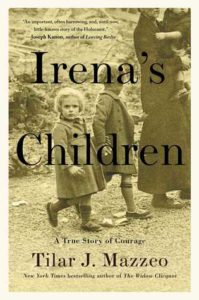
Irena’s Children: A True Story of Courage – 9781476778501 – Gallery Books – Hardcover – $26 – ebook versions available at lower prices.
Author Tilar Mazzeo is a terrific storyteller, who took on the task to tell the world about an inspiring, heroic and terrifying story with this book, the true story of one woman who, with a network of associates, saved 2,500 Jewish children from the Nazis during World War II. The main subject of the book is Irena Sendler, who was a young social worker in Warsaw, living in a socially and politically progressive milieu, when the Germans began World War II by invading Poland.
Poland, of course, was quickly defeated by the larger and more modern German army. The conquered country’s resources, human and otherwise, were turned toward the use of the German war effort, with hundreds of thousands of Poles used as slave laborers as their country was occupied by a brutal military regime. And the Germans then began their concerted efforts to destroy the large Jewish population of that country. While many Poles opposed the Nazis, with partisans fighting them from the outset of the war, some Poles were active collaborators with the Fascists, and many more simply did their best to survive under impossible conditions.
Some Poles risked everything to rescue Jews from the near total eradication of that community that the Germans sought.
Irena Sendler and a close circle of her friends and work associates undertook what we now can recognize as an heroic effort to save some of the children of the Warsaw ghetto. For almost four years, they took immense risks and dangers upon themselves and their families, to rescue innocents from the horrors they could see were happening all around them.
While everything in this book reads like a terrifying, fast-paced novel, Mazzeo has pieced together a completely true story of unimaginable heroism by many “regular” citizens of Poland. Irena Sendler, together with the help of a network of local people and the Jewish resistance, was able to save upwards of 2,500 Jewish children from likely death in the brutal concentration camps to which most Polish Jews were sent. Irena herself went back and forth into the Jewish ghetto, sneaking children out in a myriad of ways, and then found refuge for the children with local Polish families, convents, churches and farmers.
It was an incredible effort. Irena Sendler knew the terrible risks – she was at one point brutally tortured by the Gestapo – but also knew she could not fail to act.
It is incredible that she and so many of her cohorts survived the war. But then, of course, she and Poland had to survive the takeover of her country by the Soviets, and that meant that the story of her wartime heroism could not be told until long after the war had ended. Mazzeo’s effort here to celebrate and tell this amazing story is extraordinary, and much appreciated. Irena Sendler and her network of heroes serves as inspiration and constant reminder that we “regular citizens” must be prepared to face moral choices at any time, sometimes with dire consequences. So many good people were killed in this terrible war.
It is impossible to read this book and not wonder how any of us would have responded then. And of course we must each ask our selves honestly, how will we respond when our time to act is upon us?
I really enjoyed reading this book. It brought up powerful emotions and important questions. Mazzeo is both a fine writer and a terrific researcher, and in this book displays both those talents in full flower. We had a really interesting conversation about this book. There is so much in it I did not want to discuss in detail, so readers will be able to have the full experience of the book for themselves, but we had much to talk about nonetheless.
Tilar Mazzeo is the Clara C. Piper Associate Professor of English at Colby College, in Waterville, Maine. She is the author of numerous works of narrative nonfiction, including the New York Times bestselling The Widow Clicquot.
There’s a wonderful portrait of Sendler, written while she was still alive here and a website devoted to her life and story called Life in a Jar.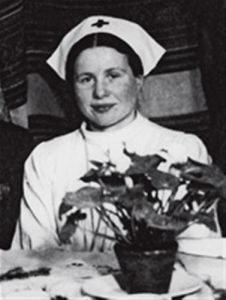

Podcast: Play in new window | Download
Johanna Skibsrud: Quartet for the End of Time (A Novel)
March 6, 2016 by David
Filed under Fiction, WritersCast
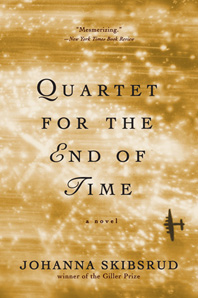 9780393351828 – W.W. Norton – 480 pages – paperback – ebook versions available at lower prices.
9780393351828 – W.W. Norton – 480 pages – paperback – ebook versions available at lower prices.
I’ve been interested in Canadian writer Johanna Skibsrud’s work for several years, in fact since interviewing independent publisher Andrew Steves of Gaspereau Press. The small Nova Scotia based press was the original publisher of Skibsrud’s first novel, The Sentimentalists, selected for the prestigious Giller Prize in 2010. It was a major literary event in Canada for such a tiny press to be recognized for publishing a fine novel that ultimately became a commercially successful book.
Skibsrud is a prolific and multi-talented writer. Her short story collection, This Will Be Difficult to Explain and Other Stories was published in 2011 and shortlisted for Canada’s Danuta Gleed Award. She has also published two books of poetry: Late Nights With Wild Cowboys (2008), which was shortlisted for the Gerald Lampert Award for the best first book of poetry by a Canadian poet, and I Do Not Think That I Could Love a Human Being (2010), which was short-listed for the 2011 Atlantic Poetry Prize.
Skibsrud now teaches at the University of Arizona in Tucson, returning to Canada with her family every summer. Since I had the good fortune to be visiting Tucson in January, 2016, I interviewed Johanna there about her newest novel, The Quartet for the End of Time.
This book is inspired by and structured to follow Oliver Messiaen’s chamber piece of the same name (Quatuor pour la fin du temps). Messiaen’s piece was composed and first performed in 1941 while he was a prisoner of war in a German prison camp. His beautiful and haunting composition was in turn inspired by a text from the Book of Revelation:
And I saw another mighty angel come down from heaven, clothed with a cloud: and a rainbow was upon his head, and his face was as it were the sun, and his feet as pillars of fire … and he set his right foot upon the sea, and his left foot on the earth …. And the angel which I saw stand upon the sea and upon the earth lifted up his hand to heaven, and sware by him that liveth for ever and ever … that there should be time no longer: But in the days of the voice of the seventh angel, when he shall begin to sound, the mystery of God should be finished ….
Skibsrud’s novel is centered on a single moment of betrayal and how it affects the four characters whose stories are woven together during the period of the Bonus Army march and the 1930s, leading up to and then through the period of World War II.
The novel’s beginning is about Bonus Army marcher and World War I veteran Arthur Sinclair, who is falsely accused of conspiracy and then disappears. The mystery of this event will affect his son, Douglas and also Alden and Sutton Kelly, the children of a U.S. congressman who become connected to Arthur and Douglas while the marchers are camped in Washington, D.C. The book then follows these characters as they live through the period of massive social change that took place during the period leading up to and during World War II.
This novel is thoroughly compelling, beautifully written, complex in form and lyrical in language. I think Johanna has succeeded in her effort to imagine a story of loss and love through the lens of a complicated period of modern history. Tim O’Brien said this about the book, praising “…its intimate and completely compelling portraits of human beings struggling to do the right thing under ambiguous moral circumstances.”
I very much enjoyed talking with Johanna Skibsrud about this book and her work as a writer. She is as intelligent and interesting to talk to as she is to read. This interview was recorded in her office at the University of Arizona. If you want to learn more about this author’s work, I recommend visiting Johanna’s website.
And if you’re interested in the Bonus March, which is a far too little known, and truly disheartening episode of American history, you might also be interested in Georgia Lowe’s novel, The Bonus. I talked to her about this book and the Bonus March story for Writerscast in 2012.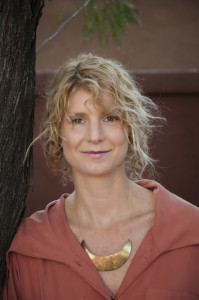
Podcast: Play in new window | Download
Aharon Appelfeld: Blooms of Darkness
May 15, 2010 by David
Filed under Fiction, WritersCast
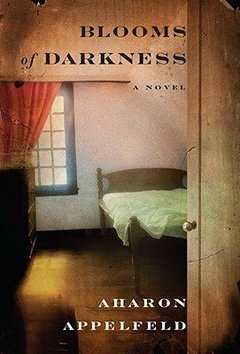 978-0805242805 – Shocken Books – Hardcover – $25.95
978-0805242805 – Shocken Books – Hardcover – $25.95
Aharon Appelfeld’s Blooms of Darkness is a powerful, majestic and triumphant coming of age novel. It’s told entirely in the first person, in sentences that are short, sharp, clear and beautifully composed. And since we know that it was written originally in Hebrew, the translator, Jeffrey M. Green, deserves special mention for the excellent English version we have here.
The book takes place in an unnamed city in Ukraine from 1943 to the end of the war, not even three years. The narrator and central character is Hugo, 11 years old at the outset of the novel, taken by his mother to stay with her closest friend Mariana, who turns out to be a prostitute living in a brothel. Much of the novel, therefore, takes place in the closet and room they share, under constant threat of exposure and death. The sense of living in a highly charged atmosphere, in such an internal space, is almost palpably claustrophobic, and inhabits every element of the story. The relationship between Hugo and Mariana is the core of the novel; they each suffer, they depend entirely upon each other. Their relationship grows and deepens through the course of the novel and its experience becomes a powerful transformative force for Hugo, who, like the author, survives the war as a completely different person than he was when his story begins.
Aharon Appelfeld has lived in Jerusalem for more than sixty years. He speaks many languages, but now writes only in Hebrew, which he learned only as an adult. We talked in depth about the events and characters in this beautiful novel, the nature of fiction as opposed to memoir, and about the author’s life as a Holocaust survivor and Jewish writer and teacher. Blooms of Darkness is a novel that has stayed with me since I read it; its story is one of hope and survival, as is the life of its author. This novel was transformative for me, as was my discussion with its brilliant author.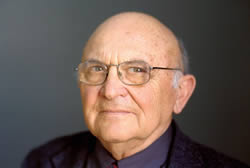
Podcast: Play in new window | Download

